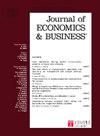Investigating the Effect of Strategic Planning on the Financial Performance of SMEs in Namibia
IF 3.3
Q1 BUSINESS, FINANCE
引用次数: 0
Abstract
Small and Medium Enterprises (SMEs) are hypothesised to play a critical part and serve as a crucial source of income and employment creation in many economies. SMEs contribute about 12% of the Namibian Gross Domestic Product (GDP) and provide employment or income to about 160 000 Namibian citizens. Namibia has witnessed remarkable growth in the number of SMEs in recent decades, with over 28 000 formally registered SMEs. However, most SMEs in Namibia experience difficulties, some of which may threaten their existence. Numerous external and internal factors impact business performance: failure to develop strategic plans, lack of finance, poor financial management, and lack of suitable management skills. The literature argues that financial performance challenges faced by SMEs can be mitigated with a clear and well-articulated strategic plan. This study set out to investigate the effect of strategic planning on the financial performance of SMEs. The results confirm that strategic planning has a positive effect on the financial performance of SMEs. However, many SMEs indicated that they had never done strategic planning. The study also found that Issue-based strategic planning is a commonly used strategic planning model. Policy implications indicate that although strategic planning is found to enhance SMEs' financial performance, the majority of them lack an optimal mix of strategic planning elements. The study recommends using strategic planning to set clear financial performance targets and for relevant stakeholders to introduce policies that help equip SME owners/managers with the optimal mix of business management skills.研究战略规划对纳米比亚中小企业财务绩效的影响
中小型企业(sme)被认为在许多经济体中发挥着关键作用,是收入和创造就业的重要来源。中小企业约占纳米比亚国内生产总值(GDP)的12%,并为约16万纳米比亚公民提供就业或收入。近几十年来,纳米比亚的中小企业数量显著增长,正式注册的中小企业超过2.8万家。然而,纳米比亚的大多数中小企业都遇到困难,其中一些可能威胁到它们的生存。许多外部和内部因素影响业务绩效:未能制定战略计划,缺乏资金,财务管理不善,缺乏适当的管理技能。文献认为,中小企业所面临的财务绩效挑战可以通过一个清晰而清晰的战略计划来缓解。本研究旨在探讨战略规划对中小企业财务绩效的影响。研究结果证实了战略规划对中小企业财务绩效的正向影响。然而,许多中小企业表示,他们从来没有做过战略规划。研究还发现,基于问题的战略规划是一种常用的战略规划模型。政策含义表明,虽然战略规划被发现可以提高中小企业的财务绩效,但大多数中小企业缺乏战略规划要素的最佳组合。该研究建议使用战略规划来制定明确的财务绩效目标,并为相关利益相关者引入政策,帮助中小企业所有者/管理者掌握最佳的业务管理技能组合。
本文章由计算机程序翻译,如有差异,请以英文原文为准。
求助全文
约1分钟内获得全文
求助全文
来源期刊

JOURNAL OF ECONOMICS AND BUSINESS
BUSINESS, FINANCE-
CiteScore
6.20
自引率
2.60%
发文量
31
期刊介绍:
Journal of Economics and Business: Studies in Corporate and Financial Behavior. The Journal publishes high quality research papers in all fields of finance and in closely related fields of economics. The Journal is interested in both theoretical and applied research with an emphasis on topics in corporate finance, financial markets and institutions, and investments. Research in real estate, insurance, monetary theory and policy, and industrial organization is also welcomed. Papers that deal with the relation between the financial structure of firms and the industrial structure of the product market are especially encouraged.
 求助内容:
求助内容: 应助结果提醒方式:
应助结果提醒方式:


